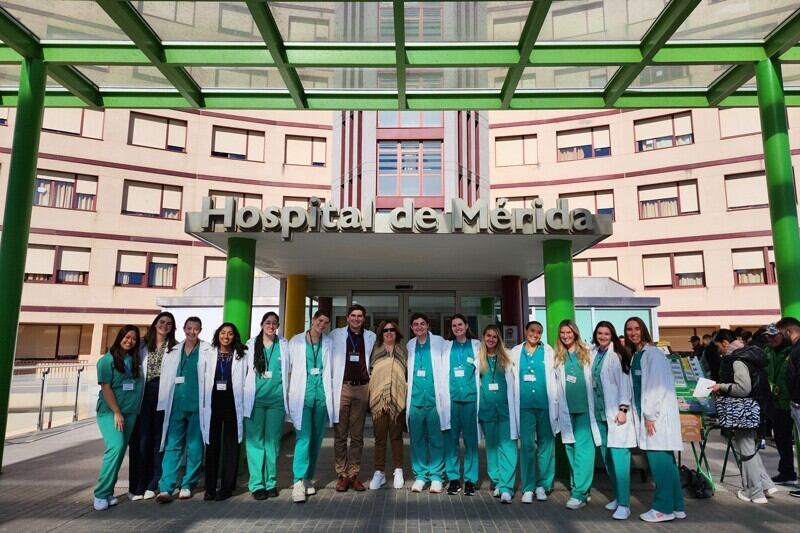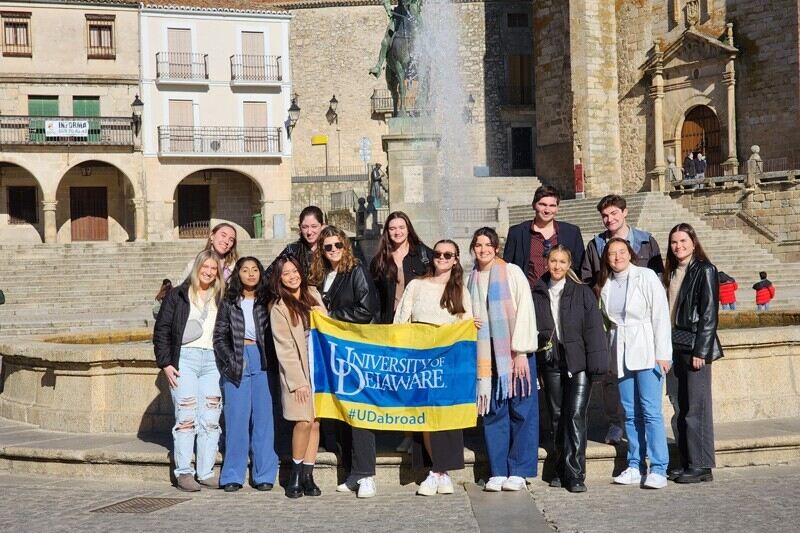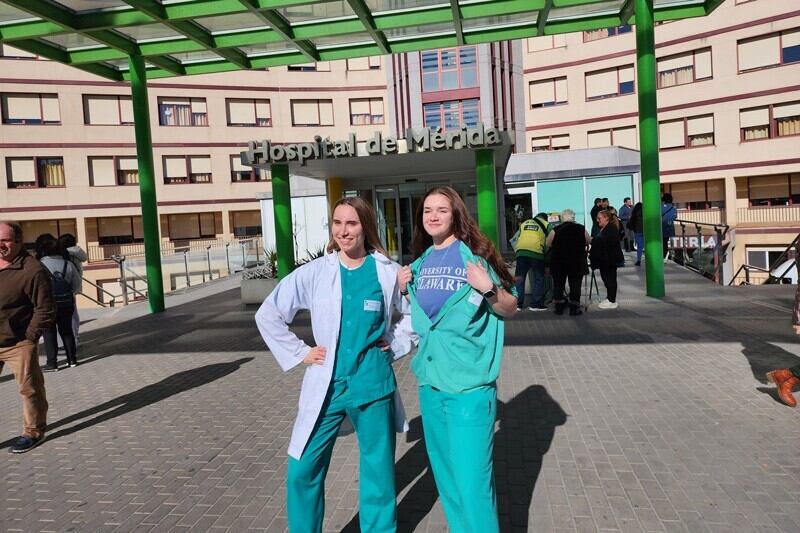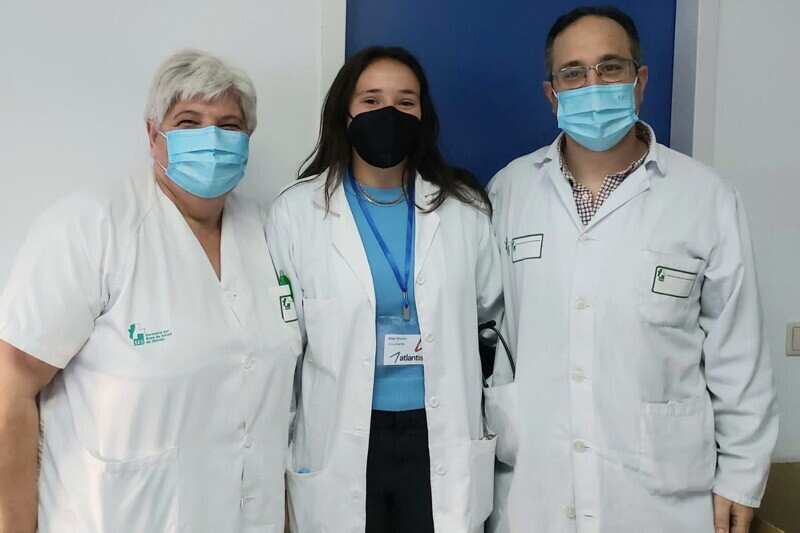
UD students see surgeries for first time in Winter Session study abroad in Spain
On her second day in pediatrics at Hospital de Mérida in Spain, Shannon Eberle was mid-conversation with a physician when they were forced to drop everything to help an 8-month-old baby suffering from repetitive seizures.
“He was turned on his side and given high-flow oxygen,” Eberle recalled. “That day, he had five more seizures.”
The junior, who is majoring in medical diagnostics with a pre-physician assistant (PA) concentration (MDD-Pre-PA), was shadowing doctors at the teaching hospital in Mérida over Winter Session as part of the University of Delaware’s first study abroad trip to Mérida. For the first time, Eberle saw the diagnosis process unfold.
“He had an MRI to rule out brain tumors, and that was clear,” Eberle said. “He didn’t have a fever, so that rules out febrile seizures.”
Then, she observed a lumbar puncture, and thanks to her Body Fluids Analysis class at UD, she knew exactly what she was seeing.
“They were looking at the color and texture of cerebrospinal fluid and knowing what normal cerebrospinal fluid looks like, it was interesting to read the test results and compare that,” Eberle said.

The child’s glucose levels were normal, so that ruled out a bacterial infection, and led doctors to believe a viral infection was causing the seizures, so they started the child on the antiviral Acyclovir.
“It was interesting to see the process of elimination that led to the diagnosis,” Eberle said. “I was able to identify certain antibodies through my Clinical Immunology and Virology at UD which helped the diagnosis make sense to me. That was the number one class that helped me understand what I was seeing and what having elevated white blood cells meant in this case.”
This is exactly the kind of application Virginia Hughes, associate professor medical and molecular sciences, wants to see.
“The classes they take serve as a foundation, and in education, we want students to apply that knowledge,” Hughes said. “Upon observing the lumbar puncture, Shannon was able to cherry pick out the significance of those results and align it to the patient’s diagnosis.”
The next week, Eberle switched rotations to shadow physicians in a different specialty but texted a fellow classmate to inquire about the child.
“He was still hospitalized at the time, so they’re still trying to figure it out. It breaks my heart because I wanted to see it through,” Eberle said.

Someday, she and her classmates will have the opportunity to see cases through as they continue their health profession journey.
Hughes led the University’s first trip to Mérida, which included more than a dozen students from the College of Health Sciences and the College of Arts and Sciences. The experience, in cooperation with Atlantis, coincided with the centennial of UD’s study abroad program, the first program of its kind in the U.S.
“The medical staff at this teaching hospital have really gone out of their way to ensure that our students see as much as they possibly can and get the absolute best education they possibly can, and I just think that’s really special,” Hughes said. “It’s almost like an innate collegiality culture.”
The study abroad experience, like so many, also included visits to other cities, including Caceres and Trujillo, where students saw ancient preserved Roman architectural sites, tried new foods, tasted exotic wines, and immersed themselves in rich culture. But what makes this trip standout is students’ opportunities to observe the differences between the two healthcare systems first-hand as part of their International Healthcare Practicum. For most, this marked the first time they stepped inside an operating room, a memorable moment that all but solidified that medical school is their path forward.
“One of the reasons I came on this trip was to figure out which specialty really calls to me,” said Yasmine Awayes. “I’m really interested in the hospital environment, especially surgery.”
Awayes, a senior medical diagnostics major who’s in the process of applying to medical school, jumps at the chance to get inside hospitals. She stepped up to process COVID-19 tests at Bayhealth Hospital Kent Campus during the omicron surge. But the trip to Mérida marked her first time seeing a surgery up close.
“I remember asking local hospitals if I could observe a surgery, and I’ve never been allowed, so that was what I was most looking forward to abroad, and it did not disappoint,” Awayes said.
Awayes witnessed a surgery to remove colon cancer and liked the feeling of being inside an operating room (OR).
“I always had the impression that it was a strict environment inside the OR, but it was nice and chill,” Awayes said. “The doctors all work together as a team and have a strong rapport. It’s really satisfying.”
Carter Erickson, a sophomore neuroscience major with plans to go to medical school, saw 17 surgeries in a single week in the traumatology unit.
“I had never been inside an OR, so it’s taught me a lot about teamwork, and luckily the doctors let us get close enough to actually see what was going on,” Erickson said. “It was an amazing experience.”
Kristelle Juhasz, a junior biology major, who also wants to go to medical school, appreciated the opportunity to learn from residents.
“I haven’t had experience interacting with medical students,” Juhasz said. “I see myself in a lot of them, and seeing the way a person progresses to become a doctor helps humanize the profession.”
Hughes said study abroad trips are viewed favorably by medical school admissions committees.
“The more diverse your portfolio, the more competitive applicant you will be,” Hughes said. “If your portfolio includes a trip abroad, where you had the opportunity to shadow physicians and observe surgeries, it certainly gives you a competitive advantage.”
Aidan Keener, a sophomore biology major on the pre-med track, spent the bulk of his time in internal medicine. In rheumatology, he learned about the power of patient consults.
“I had a lot of positive interactions with patients,” he said. “I’ve learned to personalize consults and not only to show an interest in your patient’s life but show that you care about the rest of their life.”
For students like Awayes and others with majors in the Medical and Molecular Sciences (MMSC) Department, participation in the World Scholars Program takes careful planning to ensure all prerequisite courses are met. But UD’s Winter Session provides a unique opportunity for MMSC students.
“A major challenge for MDD-Pre-PA students is earning patient contact and shadowing hours,” Hughes said. “While this trip doesn’t include patient contact hours, a cogent benefit of this experience abroad during Winter Session is that it includes 75 shadowing hours, satisfying that requirement. It’s also a wonderful opportunity for students to learn about the universal healthcare model used in many European countries.”
Esther Biswas-Fiss, chair of the MMSC Department, emphasized the importance of a global perspective for aspiring health professionals whether they choose to work in a lab or a hospital setting.
“The Medical and Molecular Sciences Department’s global health study abroad program demonstrates that UD’s MMSC programs are achieving the goal of training the next generation of leaders in the fields of science and medicine,” Biswas-Fiss said. “Cultural competency is a critically important component of a college education and essential in healthcare. That the MMSC Department is part of a tradition that connects our students to people and places on another continent is extremely gratifying and a testimony to our excellent team of faculty and staff who educate our students.”

Through the abroad experience, Ellie O’Keefe, a sophomore on the MDD-Pre-PA track, learned she’s interested in specializing in cardiology.
“The doctors in the cardiology wing took the time to explain every EKG and echocardiogram to ensure I knew exactly what I was looking at,” O’Keefe said.
She said the doctors’ willingness to teach, even amid tough-at-times language barriers, has been nothing short of amazing.
“I was not at all expecting to stand right next to the lead surgeon while he was lasering a tumor in someone’s throat,” O’Keefe said. “That was by far one of the coolest things I’ve seen.”
For O’Keefe and Eberle, the trip to Spain also marked their first time abroad in Europe.
“Life in America can be in a bubble, and it’s important when opportunities like this come up, especially within our major, to learn about other cultures because it opens our perspective, makes us better healthcare professionals, and forces us to pop that bubble,” O’Keefe said.

